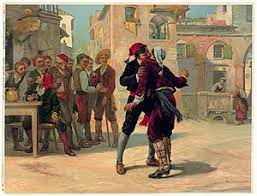Cavalleria Rusticana

by Pietro Mascagni
“Beat me and yell at me! I will still love you, though what I suffer is almost unbearable.”
Paired most often with its fellow verismo classic, I Pagliacci, Cavalleria Rusticana (Rustic Chivalry) shares with its partner: profoundly beautiful music; adultery; southern Italian notions of justice, viz. vengeance; characters whose emotions are so heightened that they lead to acts of violence. There is plenty of bad behavior here, but the music so touches us that we want to forgive these very human acts. Life in this world is cheap and often short, and one must seize pleasure and love wherever it can be found!
Excerpt:
Santuzza: “Voi lo sapete…”
“Don’t you remember, Mama, before he left for the army,
Turiddu courted Lola, and he promised to marry her.
She told him that she would wait for his return.
But then, when he got back, she’d gone and married Alfio.
So to soothe the pain in his aching heart, he came to me.
He said he loved me. And I loved him! I loved him! Ah, I loved him.
Lola envied me. She wanted him for herself.
She forgot her husband, was consumed with jealousy.
She stole him! She stole him from me! That’s not all she stole.
She also took my honor! She and Turiddu are lovers again.
I’m left with nothing, nothing but pain. Nothing but pain. I weep, and weep.”
Libretto copyright Kenneth Jakobs 2023 All rights reserved
Notes
Premiering in 1890 (three years before Puccini’s first triumph with Manon Lescaut), Cavalleria Rusticana is generally recognized as the first successful example of the new style of Italian realism (verismo). It was enormously successful, and Mascagni was even hailed as the long-awaited heir to Verdi. (In fact, it sounds apocryphal to me, but it has been reported that Verdi, upon hearing Cavalleria, said, “Now I can die content”.)
I believe you will enjoy this new, heartfelt and very entertaining English performing version.
